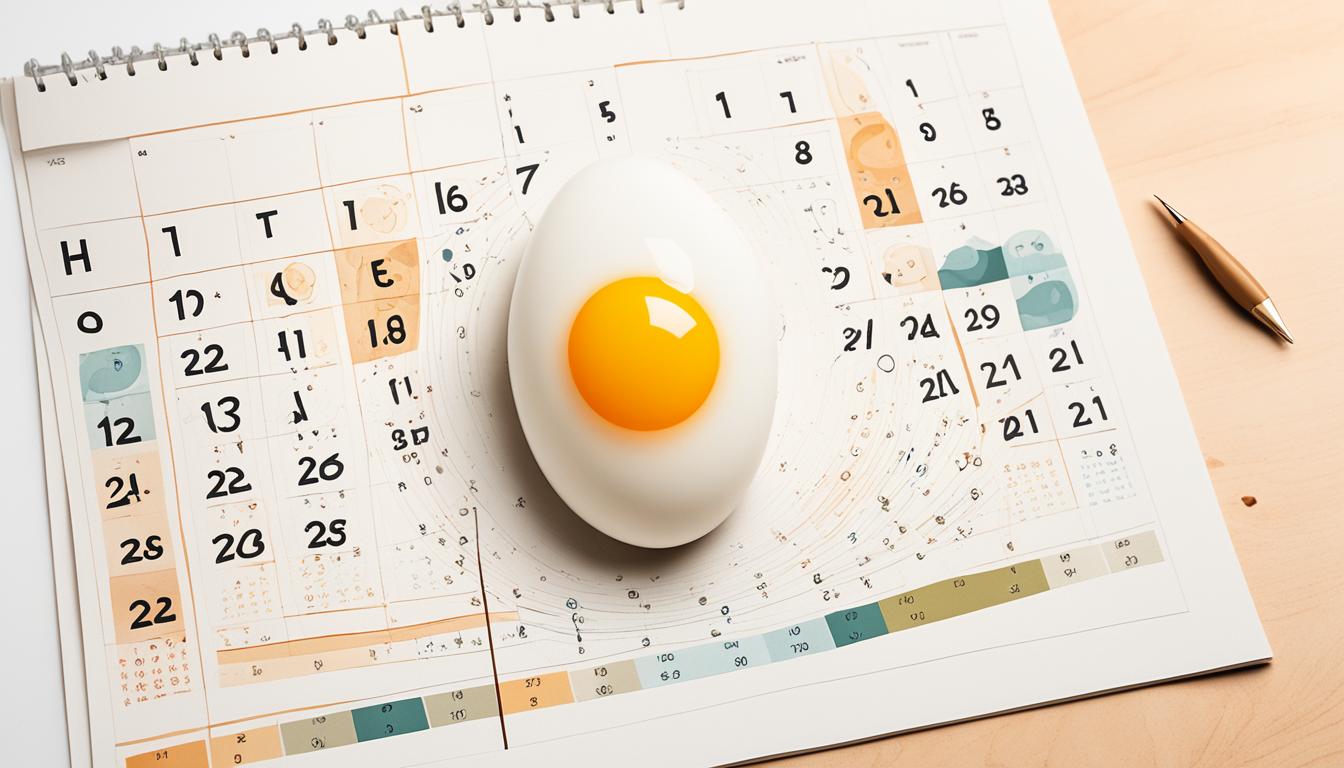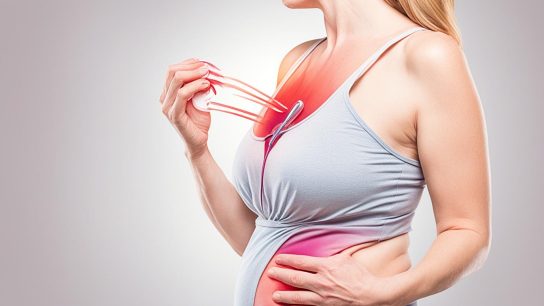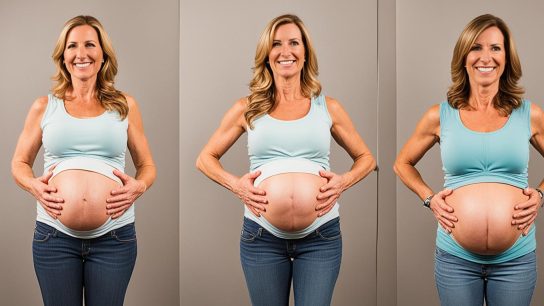Have you ever wondered how many days after your period you can get pregnant? Understanding your fertility window after your period is crucial if you’re planning to conceive. While the chances of getting pregnant right after your period are lower, it’s still possible. Let’s explore the ovulation and conception timeline to better understand your fertility.
The menstrual cycle begins on the first day of your period and continues until the first day of your next period. The most fertile time in your cycle is around the time of ovulation, which typically occurs 12 to 14 days before your next period starts. However, it’s important to note that sperm can survive in the body for up to 7 days, so if you ovulate within that timeframe, there is still a chance of getting pregnant.
Understanding ovulation and fertility is essential. Ovulation is the process where an egg is released from the ovaries. The fertile days in your cycle are when you’re most likely to conceive. These days usually occur around 12 to 14 days before your next period starts.
Factors such as age and cycle irregularities can affect your pregnancy chances after your period. As you get older, fertility naturally declines, and the quality and quantity of eggs decrease. Additionally, irregular cycles or not ovulating regularly can make it more challenging to determine your fertile window.
While tracking your menstrual cycle and using fertility awareness methods can help you calculate your ovulation window, it’s important to remember that these methods are not foolproof.
There are several other factors to consider when trying to conceive, such as maintaining a healthy weight, reducing stress levels, avoiding smoking and excessive alcohol intake, and managing any underlying medical conditions that may affect fertility.
If you do not want to become pregnant, it’s recommended to use contraception consistently and correctly. Using birth control methods such as condoms, hormonal contraceptives, or intrauterine devices (IUDs) can help prevent pregnancy.
Understanding your menstrual cycle, tracking your fertile window, and taking care of your overall health and well-being can increase your chances of getting pregnant. However, if you have concerns about your fertility, it’s always best to consult with a healthcare provider for personalized advice and guidance.
How Many Days After Your Period Can You Get Pregnant?
Ovulation is a pivotal process in the menstrual cycle that plays a crucial role in conception. It is the phase when a mature egg is released from the ovaries and becomes available for fertilization. Understanding this process and identifying the fertile days in your cycle can significantly increase your chances of getting pregnant.
Typically, the fertile days occur around 12 to 14 days before your next period starts. However, it’s important to note that each woman’s menstrual cycle may vary, with an average length of 28 to 32 days. During the menstrual cycle, the lining of the uterus thickens in preparation for a potential pregnancy. If fertilization does not occur, the lining sheds, resulting in the menstrual bleeding.
The chances of getting pregnant right after your period are generally lower but not impossible, especially if you have a shorter menstrual cycle or ovulate earlier than expected. The key is to be aware of the timing and understand the subtle cues your body provides.
To better grasp the concept, let’s take a closer look at the menstrual cycle and ovulation process:
- The menstrual cycle begins on the first day of your period.
- The ovaries prepare for ovulation by developing a mature egg.
- Ovulation occurs when the mature egg is released from one of the ovaries.
- The released egg travels through the fallopian tube towards the uterus.
- If a sperm successfully fertilizes the egg during this journey, pregnancy may occur.
- If fertilization does not occur, the egg disintegrates, and hormone levels drop, signaling the start of a new menstrual cycle.
It’s important to keep in mind that sperm can survive in the female body for up to seven days, allowing for a small window of opportunity for fertilization even if intercourse happens before ovulation.
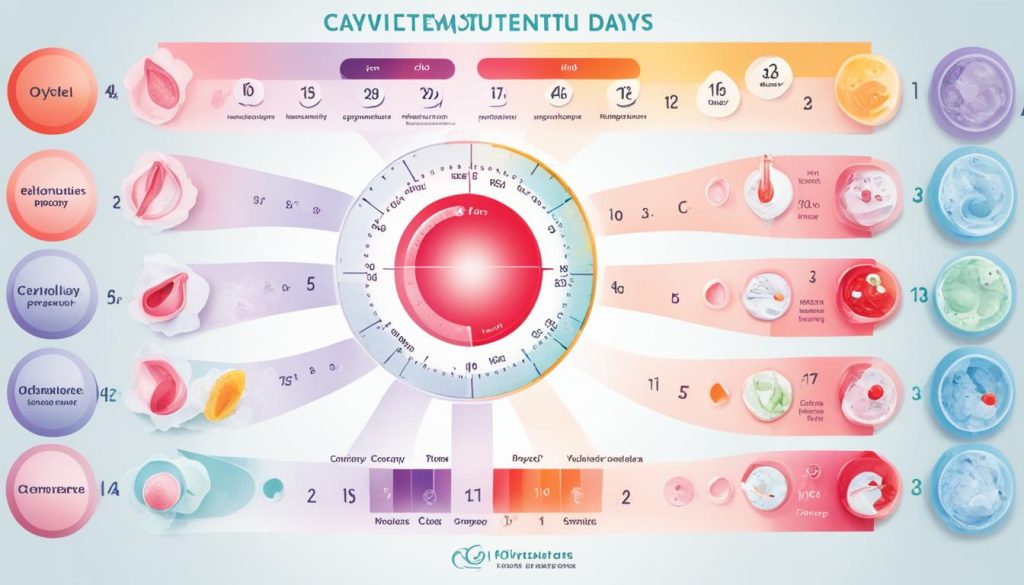
In summary, understanding ovulation and the fertile days in your cycle are vital for optimizing your chances of conception. By tracking your menstrual cycle and paying attention to your body’s signals, you can identify your most fertile days and increase your chances of getting pregnant. However, it’s crucial to remember that the exact timing of ovulation can vary, and factors like stress, illness, or hormonal imbalances may affect your menstrual cycle. If you’re trying to conceive and have concerns, consulting with a healthcare professional can provide valuable guidance tailored to your specific circumstances.
Factors Affecting Pregnancy Chances After Your Period
The best time to conceive is during your fertile window, which includes the days leading up to and including ovulation. This window can vary depending on the length of your menstrual cycle and other individual factors.
Fertility awareness methods can help you track your cycle and determine your ovulation window. These methods include:
- Tracking your basal body temperature
- Monitoring cervical mucus changes
- Using ovulation predictor kits
By charting these changes, you can estimate when you’re most likely to ovulate and increase your chances of getting pregnant.
It’s important to note that these methods are not foolproof and may require some trial and error to accurately predict ovulation.
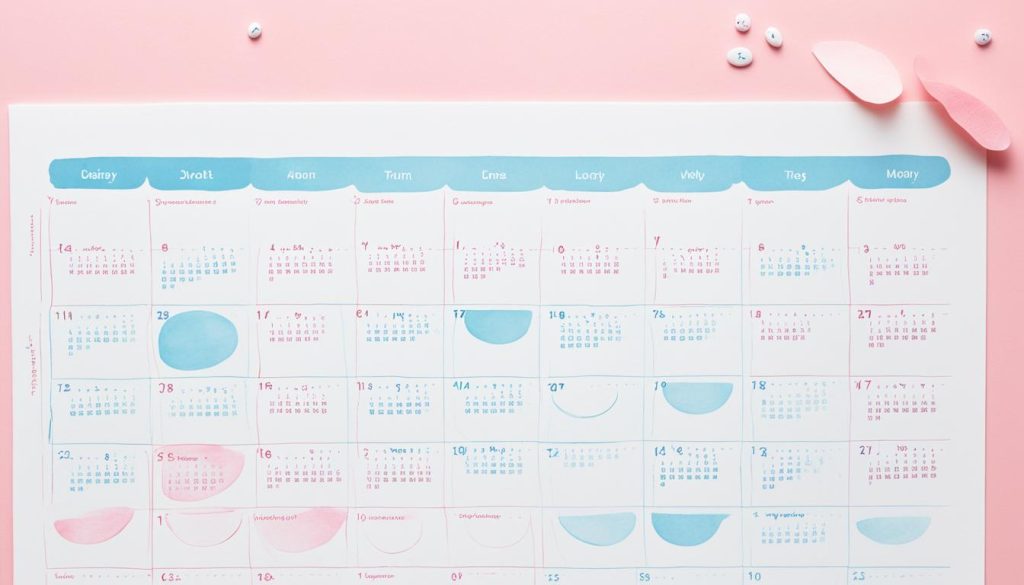
| Fertility Awareness Method | Description |
|---|---|
| Basal Body Temperature (BBT) Tracking | Tracking your body’s basal temperature to detect subtle changes that indicate ovulation |
| Cervical Mucus Changes | Monitoring changes in the consistency and color of cervical mucus to determine fertile days |
| Ovulation Predictor Kits | Using urine-based tests to detect a surge in luteinizing hormone (LH) before ovulation |
The Impact of Age and Cycle Irregularities
Age and cycle irregularities can significantly affect your chances of getting pregnant after your period. As you get older, fertility naturally declines, and the quality and quantity of eggs decrease. This decrease in fertility reduces the likelihood of conception during the fertile days after your period. It’s important to understand that age plays a crucial role in determining pregnancy chances, and the chances decrease as you get older.
Furthermore, irregular cycles or infrequent ovulation can make it more challenging to accurately predict your fertile days. If you have irregular cycles or do not ovulate regularly, it can be difficult to determine when you are most fertile. Tracking your menstrual cycles using a calendar, fertility tracker, or smartphone app can help you identify any irregularities and better understand your fertility patterns.
Consulting with a healthcare provider is recommended if you experience cycle irregularities or if you have concerns about your fertility. They can provide guidance and conduct further tests to identify any underlying issues or provide appropriate treatments to enhance your chances of conception.
The Impact of Age on Pregnancy Chances
The impact of age on fertility cannot be overstated. As women age, their egg reserve diminishes, and the quality of the eggs declines. This makes it more difficult to conceive, especially during the fertile days after your period. Here’s a table highlighting the impact of age on pregnancy chances:
| Age Group | Pregnancy Chances |
|---|---|
| Under 35 | Higher chances of pregnancy |
| 35-39 | Decreased chances of pregnancy |
| 40 and older | Significantly reduced chances of pregnancy |
As shown in the table, age plays a vital role in determining pregnancy chances. If you’re over 35, it’s important to be aware of the potential challenges you may face in conceiving after your period.
Effects of Cycle Irregularities on Fertility
Irregular cycles can make it challenging to accurately predict ovulation and identify the most fertile days after your period. Here’s a table illustrating the impact of cycle irregularities on fertility:
| Cycle Irregularity | Effects on Fertility |
|---|---|
| Irregular Menstrual Cycles | Difficulty in determining fertile days |
| Absence of Ovulation | No fertile days after your period |
| Frequent Spotting or Bleeding | Unpredictable fertile days |
As shown in the table, irregularities in menstrual cycles and ovulation can significantly impact fertility. If you experience any of these irregularities, it’s essential to speak with a healthcare provider to determine the underlying causes and explore potential treatments or fertility support options.
Other Factors to Consider for Conception
While understanding your ovulation cycle and fertility window is crucial when trying to conceive, there are other factors that can influence your chances of getting pregnant. Taking care of your overall health and well-being plays a significant role in optimizing your fertility. Here are some key considerations:
Maintain a Healthy Weight
Weight can impact your ovulation cycle and fertility. Being underweight or overweight can disrupt hormonal balance and affect the regularity of your menstrual cycle. Achieving and maintaining a healthy weight through a balanced diet and regular exercise can increase your chances of conceiving.
Reduce Stress Levels
High levels of stress can interfere with hormone production and affect ovulation. Finding healthy ways to manage stress, such as practicing relaxation techniques, engaging in physical activities, or seeking support from loved ones, can enhance your fertility.
Avoid Smoking and Excessive Alcohol Intake
Smoking and excessive alcohol consumption can have harmful effects on fertility. Smoking can damage the eggs and reduce the quality of sperm, while heavy alcohol intake can disrupt hormone levels. Quitting smoking and limiting alcohol consumption can improve your chances of getting pregnant.
Manage Underlying Medical Conditions
Some medical conditions, such as polycystic ovary syndrome (PCOS) or thyroid disorders, can affect fertility. It’s important to work with your healthcare provider to manage these conditions and optimize your fertility potential.
By considering these factors and taking steps to improve your overall health, you can increase your chances of conceiving after your period. It’s essential to prioritize self-care and make informed choices to support your fertility journey.
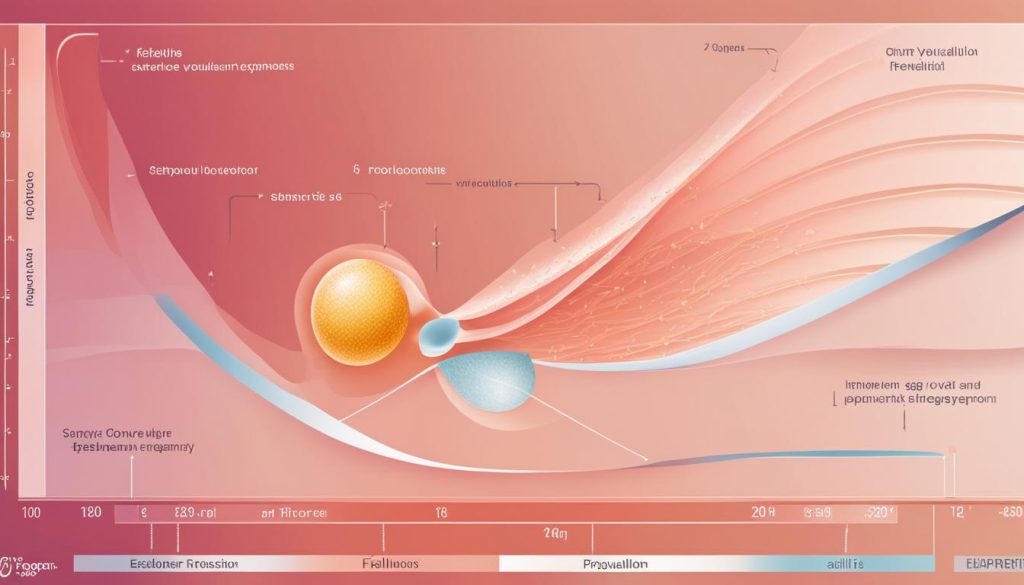
| Factor | Impact on Fertility |
|---|---|
| Maintaining a Healthy Weight | Optimizes hormonal balance and regularity of ovulation |
| Reducing Stress Levels | Improves hormone production and ovulation |
| Avoiding Smoking and Excessive Alcohol Intake | Preserves egg and sperm quality, maintains hormone balance |
| Managing Underlying Medical Conditions | Addresses potential fertility obstacles |
Birth Control and Pregnancy Prevention
If you do not want to become pregnant, it’s important to use contraception consistently and correctly. While the chances of getting pregnant right after your period are lower, it is still possible. Using birth control methods such as condoms, hormonal contraceptives, or intrauterine devices (IUDs) can help prevent pregnancy. It’s recommended to speak with a healthcare provider to determine which contraceptive method is best for you.
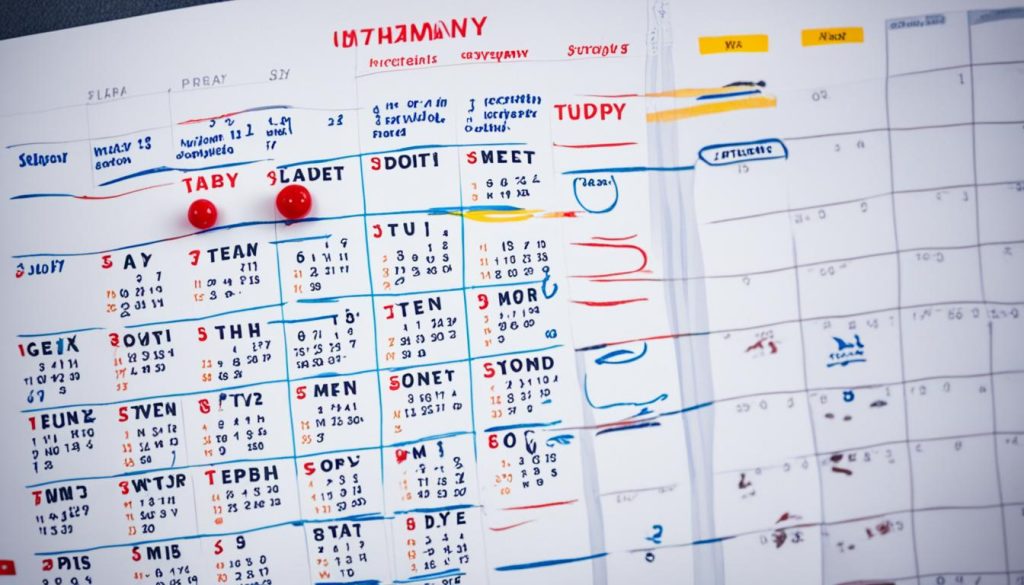
Did you know? Condoms are a popular and easily accessible form of birth control. They help prevent pregnancy by acting as a barrier method, preventing sperm from reaching the egg. Hormonal contraceptives, like birth control pills or patches, work by releasing hormones that prevent ovulation and thicken cervical mucus, making it difficult for sperm to reach the egg. Intrauterine devices (IUDs) are a long-term, reversible contraceptive option that is placed inside the uterus to prevent pregnancy. They can be either hormonal or non-hormonal, and they are highly effective in preventing pregnancy.
Finding the Right Method for You
When it comes to choosing a contraceptive method, there are several factors to consider. Your lifestyle, health history, and personal preferences can all play a role in determining the best option for you. It’s essential to have an open and honest conversation with your healthcare provider about your contraceptive needs and goals.
Here are some questions you can discuss:
- Do you have any underlying health conditions that may affect your contraceptive options?
- Are you looking for a temporary or long-term contraceptive method?
- Do you prefer a method that does not involve hormones?
- Are you concerned about potential side effects of hormonal contraceptives?
- Do you have any specific lifestyle factors, such as travel or frequent sexual activity, that may influence your contraceptive choice?
By addressing these questions and concerns, you can work together with your healthcare provider to find the right contraceptive method that aligns with your needs and preferences.
Conclusion
Understanding your menstrual cycle and the factors that affect fertility is crucial when trying to conceive. While the chances of getting pregnant right after your period are lower, it’s important to remember that conception can occur at any time during your menstrual cycle. Tracking your fertile window, which is usually around 12 to 14 days before your next period, can significantly increase your chances of getting pregnant.
If you do not want to become pregnant, it’s essential to use contraception consistently and correctly. While the chances of conception after your period are lower, there is still a possibility, especially if you have a shorter menstrual cycle or ovulate earlier than expected. It’s always a good idea to consult with a healthcare provider to determine the best contraceptive method for you.
Age and cycle irregularities can also impact fertility. As you age, fertility naturally declines, so timing becomes even more crucial. It’s important to take care of your overall health and well-being by maintaining a healthy weight, reducing stress levels, and managing any underlying medical conditions that may affect fertility.
Remember, if you have concerns about your fertility or are having difficulty conceiving, don’t hesitate to reach out to a healthcare provider. They can provide personalized advice, guidance, and help you navigate your fertility journey. Take control of your fertility by understanding your menstrual cycle and making informed decisions.

